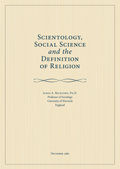My conclusion is that Scientology, whilst clearly differing from the majority of Christian churches, denominations and sects in beliefs, practices and organisational structures, nevertheless satisfies the criteria conventionally applied by social scientists in distinguishing between religion and non‑religion.
My conclusion is that Scientology, whilst clearly differing from the majority of Christian churches, denominations and sects in beliefs, practices and organisational structures, nevertheless satisfies the criteria conventionally applied by social scientists in distinguishing between religion and non‑religion.
The fact that the material basis for the religion of Scientology is organised in a business‑like manner can have no implications for its status as a religion. Does a work of art cease to be a work of art when it is efficiently produced for sale or exchange? It is naive to think that any new religious movement could survive in the modern world without a business‑like material basis for its operations, and as Canon Drury has pointed out, even the ancient Christian churches are nowadays not averse from engaging in business affairs in order to sustain or promote their services to actual and potential members. Lacking the benefits of inherited property‑wealth, endowments, patronage and a “birth right” membership, new religious movements must either act in a business‑like manner or perish.
James A. Beckford
December 1980
About the Author
When Professor Beckford wrote “Scientology, Social Science and the Definition of Religion” in 1980, he was Senior Lecturer in Sociology at the University of Durham. He is currently Professor of Sociology at the University of Warwick.





























